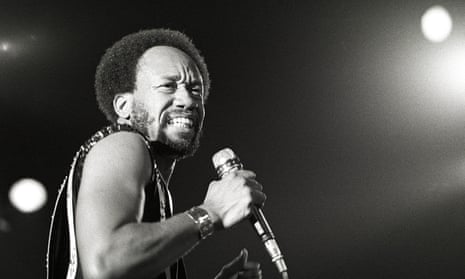When Earth, Wind & Fire shimmied into the charts and on to British television screens in May 1979 with Boogie Wonderland, they brought to an audience beyond the niche followers of soul a driving rhythm and glitzy glamour that ensured the band a massive and enduring hit. At their peak, Earth, Wind & Fire bestrode the popular music scene like a troupe of magnificently attired angels of funk, upbeat and apparently perpetually partying. Their slick blend of panache and optimism owed much to the songwriting, producing and vocals of Maurice White, who has died aged 74.
Earth, Wind & Fire’s infectious, disco-influenced songs, which also included Shining Star (1975) and After the Love Has Gone (1979), kept the band at the core of US popular culture throughout its most commercially successful period in the 70s and most of the 80s. Having now sold more than 90m albums, Earth, Wind & Fire continue to record and perform but White retired from the group in 1995. He had been diagnosed with Parkinson’s disease, although he concealed this fact for several years.
White was born in Memphis, Tennessee. His father, Verdine, was a doctor and saxophone player. By his teenage years, Maurice was living in Chicago and working as a session drummer for the influential Chess label, where he played with a range of musicians including Muddy Waters, Buddy Guy, the Impressions and Etta James. One song on which he played, Rescue Me by Fontella Bass (1965), was a worldwide hit. In 1966 he joined a trio led by the jazz pianist Ramsey Lewis and went on to play on nine of Lewis’s albums: the 1966 song Hold It Right There won a Grammy for best R&B group performance.
White formed a songwriting team in 1969 with two other Chicago-based composers, Wade Flemons and Don Whitehead, who wrote music for television and radio commercials. Signing to the Capitol label, the trio called themselves the Salty Peppers and enjoyed moderate success with a 1969 single, La La Time. This was followed by a move to Los Angeles and a new band name, derived from three astrological elements. White’s younger brother, Verdine, a flamboyant bass player, joined the lineup a year later and remains a member. Another brother, Fred, also played drums with the band in its heyday.
It took until 1973 for Earth, Wind & Fire to find a mass audience: that year, the group’s fourth album, Head to the Sky, with its danceable, groove-heavy songs featuring horns and White’s kalimba, or African thumb piano, was the first of a series of huge-selling records.
Open Our Eyes (1974) and That’s the Way of the World (1975) consolidated this position, embedding the group’s recipe of soul, funk, R&B and disco in the American public’s affections. Boogie Wonderland, on which the band collaborated with the singing sister-act the Emotions, sold more than a million copies and was in the British singles charts for three months.
Their 1978 cover of the Beatles’ Got to Get You Into My Life, injected with the band’s distinctive and inventive strident brass and guitar riffs, won a Grammy.
White was a prolific composer and producer outside Earth, Wind & Fire, working with Deniece Williams, a former vocalist in Stevie Wonder’s band, the fusion band Weather Report, Barbra Streisand, Cher and Neil Diamond. He collaborated with Barry Manilow on Only in Chicago (1980). A self-titled solo album (1985) included a hit single in the form of a cover of Ben E King’s Stand By Me. White also wrote songs for films including the Eddie Murphy vehicle Coming to America (1988), produced albums by the jazz group the Urban Knights and wrote arrangements for the British group Cleopatra.
After his retirement, occasionally White appeared with Earth, Wind & Fire at key public celebrations, including the Grammy Awards Tribute to Funk event in 2004. At an awards party in the same year, he and the soul singer Alicia Keys performed the 1978 single September. In his last major Earth, Wind & Fire-related project he oversaw a tribute album, Interpretations: Celebrating the Music of Earth, Wind & Fire (2007).
He won seven Grammy awards, with the band or as an individual performer; Earth, Wind & Fire will receive the Recording Academy’s lifetime achievement award this year.
Long before White retired from touring, Earth, Wind & Fire’s ebullient message had touched a generation. “We’ve touched so many people with these songs,” he reflected in 2000. “That was the whole objective, to try to inspire young people to believe in themselves and to follow through on their ideas.”
He is survived by his wife, his two sons, and his brothers Verdine and Fred.

Comments (…)
Sign in or create your Guardian account to join the discussion